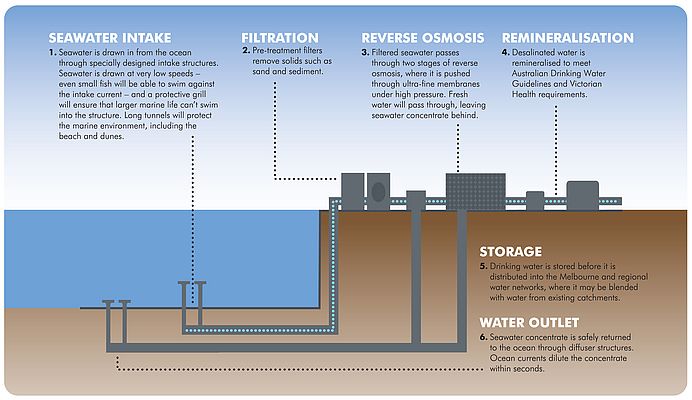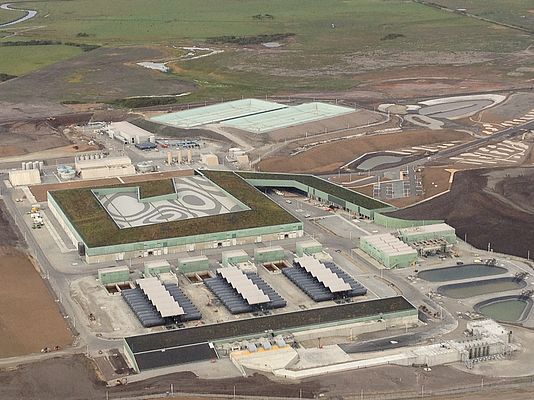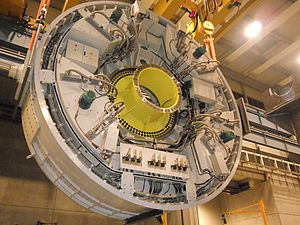A complete set of medium voltage motor and low and medium voltage variable frequency drives, have been installed in the reverse osmosis plant and the associated pipeline network of a large Australian desalination plant.
GE's Power Conversion business (NYSE: GE) was instrumental in bringing Australia's largest seawater desalination plant into operation by providing technology that provides a rainfall independent water supply to complement catchments and storages in the area around Melbourne.
The Victorian Desalination Project, 130 km southeast of Melbourne, runs on low- and medium-voltage drives and medium-voltage motors supplied by GE. The plant is among the largest reverse osmosis plants in the world. It was brought online in November 2012, completed successfully the required 30 day continuous production test and reached full operation in December, three years after construction began.
“The expertise of Degrémont in reverse osmosis technology and operations is illustrated through achieving such a rapid, incident-free commissioning phase for a project of this scale, with the milestone marking the beginning of the operational phase. We take great pride in our ability to operate such critical water infrastructure assets around the world. Our Operation team, involved in the project since the beginning of the construction phase, is now ready to manage this world-class desalination plant for decades to come,” explained Rémi Lantier, CEO of Degrémont.
The plant can supply up to 150 billion liters of drinking water per year to Melbourne and regional communities, providing a rainfall independent supply, and is a resource that will be valued particularly in times of future drought.
“GE’s success on the Victorian Desalination Project stems from its outstanding experience in design and build of motors and drives, and expertise in the overall grid system study and filter design ,” says Pascal Cros, GM General Industry. “The project enhances the company’s reputation as a worldwide leader in the design and manufacture of low- and medium-voltage electrical systems for the fast-growing desalination industry. It brings another reference to GE in the water industry, where it intends to further develop its presence across a range of industry applications including waste water, water treatment and transport.”
The AquaSure consortium, which led the project, contracted Thiess Degrémont Joint Venture to design, construct and operate the desalination plant—valued at AU$3.5 billion—together with marine structures, a 1.9 m in diameter water transfer pipeline stretching over 84 km, and an 87-km underground power line (the longest 220kV HVAC underground power cable of its type in the world) to connect the plant with the electricity grid.
The plant incorporates reverse osmosis desalination technology used by Degrémont, a subsidiary of Suez Environment and a world leader in the field.
“The Victorian desalination plant is one of the largest and most complex infrastructure projects undertaken in Australia in recent years – and in just over 36 months a very great deal has been achieved,” says Chris Herbert, CEO of AquaSure.
AquaSure has gone to great lengths to minimize the environmental impact of the desalination plant. Reverse osmosis is the most energy-efficient method of desalinating water, and the plant includes energy recovery devices to reduce power consumption. Its underground power supply is co-located with the pipeline and all operational energy is 100% offset by renewable energy certificates. The plant is covered by Australia’s largest living green roof and there is a 225 hectare revegetated coastal park for public use. Long intake and outlet tunnels help protect the coast and marine environment.
GE’s Power Conversion business designed and supplied a complete set of medium voltage motor and low and medium voltage variable frequency drives, including associated filters and transformers for use in both the reverse osmosis plant and the associated pipeline network. The use of variable speed drives rather than fixed speed motors enables the plant operator to smooth start and stop of the pumps, prevent the water hammer effect, improve control of the water flow and make energy savings. GE furthermore provided on-site supervision and commissioning.



















